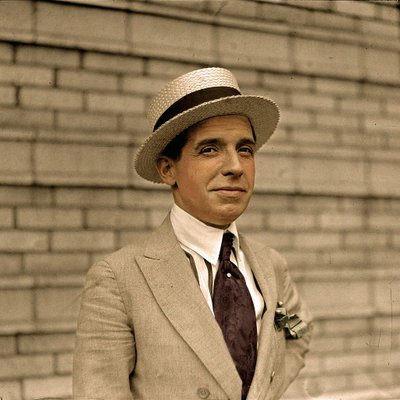Bernie Madoff and the lure of Ponzi Schemes

If you’re interested in savings and investments, you’ve probably heard of American fraudster Bernie Madoff, the man responsible for the world’s largest Ponzi scheme.
Madoff’s insatiable appetite for money led him to coordinate an elaborate Ponzi that embezzled more than US$64 billion (£46bn).
For 17 years until his arrest in 2008, Madoff conned thousands of financial institutions, charities, and people who invested in his company Bernard L. Madoff Investment Securities.
But what is a Ponzi scheme, and how can you avoid them?
Firstly, the name derives from Charles Ponzi (pictured), a 1920s conman who served 14 years in prison after promising investors 50% returns in only 90 days. A Ponzi pays existing investors with money from new investors, so the scheme appears to generate revenue and profits.
In truth, legitimate activity is minimal, and the business is simply a cycle of payments. Fraudsters who run these schemes use the cash deposited by new investors to:
- Pay old investors
- Subsidies a lavish lifestyle
How to avoid a Ponzi scheme
The scam may work initially, but eventually it will crash when income dries up, and there’s no money left to pay investors. So, how do you spot a Ponzi scheme before it is too late? Ah, the million dollar question…
Scammers are often educated professionals with extensive knowledge of the money markets. Such was the case with Madoff whose fraud remained undetected for 18 years largely because he was a:
- Well-respected New York financier
- Former chairman of the NASDAQ stock exchange
However, even if you are dealing with the most experienced swindler, there are still red flags to look out for. The most obvious sign is higher-than-average returns with little or no risk. Every investment has an element of risk, so be wary of any scheme guaranteeing risk-free returns.
Another red flag is unusually consistent returns, regardless of market conditions, especially at the start. It’s important to understand that Ponzis are constantly popping up everywhere, and even the most educated people can be fooled.
Cunning conmen
A professional trickster is unlikely to suggest ridiculously high profits as this raises suspicion. For this reason, Madoff’s investments offered reasonable, albeit fictitious, returns.
The clever lure of these schemes can dazzle the most seasoned investor, the type of person who trusts their own judgment enough to sometimes overlook due diligence. And spotting them is not so easy – Ponzi schemes are far more sophisticated than your standard phishing emails.
Truly, anyone can get duped. To quote American investment fraud expert Pat Huddleston, the moral of the story is that:
“If it sounds too good to be true, you’re dealing with an amateur.”
The 79th Group- Administration Update And What It Means for You as a Loan Note Holder
Over the past few weeks, a wave of The 79th Group companies has collapsed into formal administration, putting millions of pounds of Loan Note Holders…
Read MoreWho’s Behind Billy Jackson? Uncovering the Team and the Companies
Part 3- Unravelling the Team Behind Billy Jackson Executive Summary -Billy Jackson operates a network of companies heavily reliant on Loan Note investments, many of…
Read MoreThe 79th Group Update-What You Need To Know
Administrations, Court Cases, and What Loan Note Holders Must Know Now The financial collapse of companies within The 79th Group is rapidly entering a critical…
Read MoreT&T Trustees Appoint Administrators to 79th Luxury Living Six
Are Investor Interests Being Protected? A New Twist in The 79th Group Saga Loan note holders in 79th Luxury Living Six Ltd (LL6) were recently…
Read More



